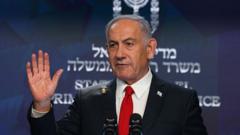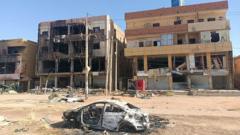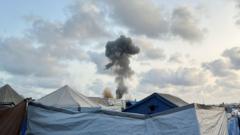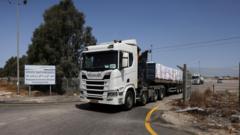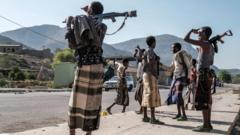The United States has responded to the escalating conflict in Sudan by imposing fresh sanctions due to claims of chemical weapon usage during the civil war against paramilitary forces, with long-standing implications for US-Sudan relations.
**US Sanctions Sudan Over Chemical Weapons Claims Amid Ongoing Civil Conflict**

**US Sanctions Sudan Over Chemical Weapons Claims Amid Ongoing Civil Conflict**
The ongoing Sudanese crisis sees new US sanctions following allegations of chemical weapon usage during the civil war.
In a stark warning to the Sudanese government, the US Department of State announced new sanctions after confirming that chemical weapons were employed in last year's civil conflict. According to spokesperson Tammy Bruce, restrictions on US exports to Sudan will commence alongside limitations on financial borrowing, coming into effect on June 6.
As the civil war rages between Sudan's military and the Rapid Support Forces (RSF), there remains an urgent call for accountability regarding reported war crimes by both factions. The recent military escalation has already claimed over 150,000 lives since its onset two years ago, particularly affecting the capital, Khartoum, and displacing millions.
While US reports indicated the use of chlorine gas by Sudanese forces, specific details on the chemical weapons have yet to be disclosed. Bruce urged the Sudanese government to adhere to the Chemical Weapons Convention (CWC), which mandates the destruction of such weapons and calls for compliance from its signatories, including Sudan. Despite previous sanctions against key military leaders for destabilizing efforts, there are concerns regarding the limited impact these measures will have on the ground.
The geopolitical ramifications of the US sanctions further intertwine with Sudan's connections to the United Arab Emirates. Tensions have risen following allegations from Sudanese officials that the UAE provided arms to the RSF. This claim has been disputed by UAE representatives, who maintain diplomatic relations with Sudan amid these conflicts. The geopolitical landscape continues to evolve, particularly as Congressional Democrats challenge potential arms sales to the UAE, reflecting the increasing complexity of international involvement in the Sudanese conflict.
As the situation unfolds, America’s insistence on accountability and adherence to international law remains a pivotal aspect of its foreign policy in the face of widespread humanitarian crises and geopolitical strife in the region.
As the civil war rages between Sudan's military and the Rapid Support Forces (RSF), there remains an urgent call for accountability regarding reported war crimes by both factions. The recent military escalation has already claimed over 150,000 lives since its onset two years ago, particularly affecting the capital, Khartoum, and displacing millions.
While US reports indicated the use of chlorine gas by Sudanese forces, specific details on the chemical weapons have yet to be disclosed. Bruce urged the Sudanese government to adhere to the Chemical Weapons Convention (CWC), which mandates the destruction of such weapons and calls for compliance from its signatories, including Sudan. Despite previous sanctions against key military leaders for destabilizing efforts, there are concerns regarding the limited impact these measures will have on the ground.
The geopolitical ramifications of the US sanctions further intertwine with Sudan's connections to the United Arab Emirates. Tensions have risen following allegations from Sudanese officials that the UAE provided arms to the RSF. This claim has been disputed by UAE representatives, who maintain diplomatic relations with Sudan amid these conflicts. The geopolitical landscape continues to evolve, particularly as Congressional Democrats challenge potential arms sales to the UAE, reflecting the increasing complexity of international involvement in the Sudanese conflict.
As the situation unfolds, America’s insistence on accountability and adherence to international law remains a pivotal aspect of its foreign policy in the face of widespread humanitarian crises and geopolitical strife in the region.




